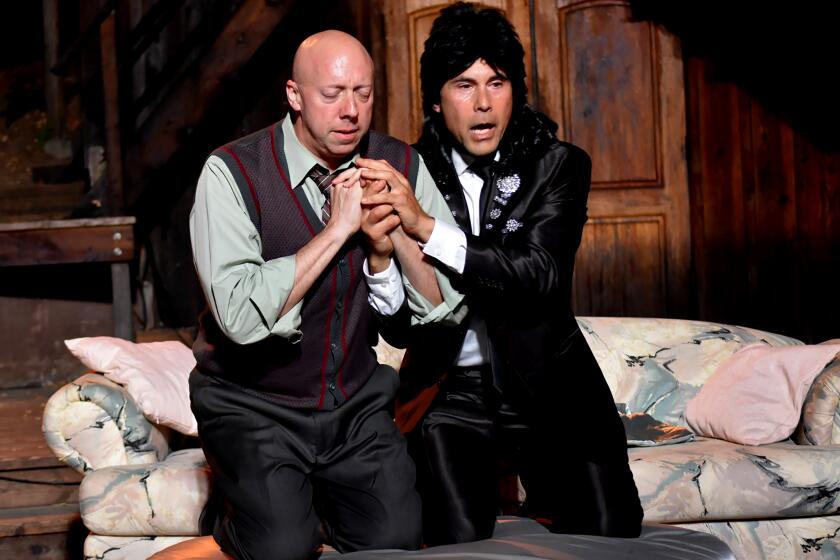Nacho Lozano--’As Chicano as American Pie’
Nacho Lozano is coming home.
Every morning for the past 30 years he has left Lido Isle for Los Angeles, where he published La Opinion--the oldest and largest Spanish-language newspaper in the nation--and where he sits on the boards of some of the city’s most prestigious corporate, cultural and philanthropic institutions: Bank of America, the Walt Disney Company, California Community Foundation, KCET and National Public Radio.
For a brief nine months in 1976, Lozano was U.S. ambassador to El Salvador.
But last year, Lozano, now 60, semiretired and turned La Opinion over to his son, Jose. Although he still commutes every day to the paper, setting policy as editor-in-chief, he is slowly reconnecting to Orange County and to his roots.
“I’ve been ‘the Latino’ on enough mainstream community organizations,” Lozano says. “It’s time I devoted more attention to things that interest me as a Latino, things that show an interest in the Latino community and culture.”
Lozano this year became a director of the Orange County Performing Arts Center. He also joined the board of the South Coast Repertory Theater and chaired the 10-member advisory board for its two-year-old Hispanic Playwrights Project--”the only effort (in the United States) being made to expose Hispanic playwrights to mainstream theater on a formalized basis.”
The playwrights project has aided 15 Latino writers in developing their talents through workshops, seminars and readings. It has also helped them make contacts with mainstream theaters. Two plays, “Charley Bacon and His Family” by Arthur Giron and Lisa Loomer’s “Birds,” were produced last year for general audiences at SCR.
Two others were produced elsewhere as a result of exposure through the project’s workshops. As chairman, Lozano “really gave us credibility,” says Jose Gonzalez, director of the Hispanic Playwrights Project. “The man is very good. He’s wonderful in terms of asking questions about the program, helping us make contact with the community and with funding institutions. He is very supportive.”
“No one (else) was willing to take a risk,” says Lozano. “Now people in New Mexico, San Diego and San Francisco are coming to see what is being written.”
Private and unassuming, Lozano is known to most as Nacho, the Spanish nickname for his formal name, Ignacio. It was also the name of his father--a Mexican immigrant “with ink in his veins,” a hard worker who bequeathed his son a business that would become a publishing dynasty, bringing him a more than comfortable livelihood and a purpose in life.
The elder Ignacio Lozano fled the prerevolutionary turmoil of Nuevo Leon, Mexico, for San Antonio, where he met his wife and founded a political weekly, La Prensa, in 1913.
Lozano remembers his father as a dedicated journalist, going back to the office every night after dinner to await the first edition. Other Mexican immigrants supported the paper, which opposed the revolution of 1910. The senior Lozano earned enough to put his son and daughter through private schools.
In 1926, the elder Lozano founded La Opinion in Los Angeles, where a wave of newly arrived Mexicans could choose from among nearly a dozen Spanish-language newspapers.
Nacho Lozano never questioned his future. Though he considered himself neither as dedicated a publisher nor as talented a writer as his father, he knew that he would study journalism (at the University of Notre Dame) and that, when his father died, he would take over the business.
Luckily for the Lozanos, Latinos continued to flock to Southern California, more than doubling their numbers in 1970-80. In 1977-86, La Opinion’s circulation grew from 22,000 to 70,000.
Latinos now constitute one-third of the population in Los Angeles County, and nearly one-fifth in Orange and San Bernardino counties. By the year 2,010, an estimated 7.8 million Latinos will make up a majority--52%--of Southern California’s population. “Who could have predicted such migration into this area over the years?” Lozano asks.
In 1957, Lozano moved his family from Brentwood to Lido Isle, a sun-dappled and yachted enclave of Newport Beach. Orange County then offered a more wholesome environment for raising children, he says, than it now does.
He belongs to the Newport Harbor Yacht Club, collects art, plays golf and vacations in Mazatlan, Hawaii and Spain. The Lozanos usually spend holidays in Mexico City, where Lozano’s sister lives.
With brown eyes ringed with blue, Lozano calls himself “as Chicano as apple pie,” meaning he has assimilated into the community while retaining his cultural ties.
“We made a point of speaking Spanish to the kids at home,” he says, “but we are all more comfortable in English.” When the Lozanos left for El Salvador, Francisco, the youngest of the four children, known to everyone as Pancho, could barely speak Spanish. When they returned nine months later, his English was so poor, his parents were afraid he wouldn’t be admitted to school. “Now we can’t get him to speak Spanish,” Lozano says with a chuckle.
Pancho, 15, lives at home with Lozano and his wife of 36 years, Marta. Jose, 33, publishes the newspaper, and daughter Monica, 30, is managing editor. Another daughter, Leticia, 35, who once worked at the paper, now lives in Italy.
In addition to running a successful business, Lozano says, he has tried to maintain his father’s legacy: “Being honest with our readers. Playing it straight in our dealings with the political world, not allowing influence by our advertisers, trying to present the news as honestly as we can.”
Under his leadership, the paper broadened its focus from Mexican issues to events throughout Central and South America and to Los Angeles issues that affect Latinos. In the ‘80s, as two competing Spanish-language dailies--Noticias del Mundo and El Diario--have appeared in Los Angeles, La Opinion has stepped up its local coverage, bringing “a renewed sense of identity to the Latino population,” according to Felix Gutierrez, journalism professor at USC.
The booming Spanish-language market can support two good papers in Los Angeles, Jose Lozano says. He plans to boost La Opinion’s Orange County circulation from 5,000 to as high as 15,000 in the next few years.
According to the publisher, La Opinion has survived by following his grandfather’s policy of reserving opinions for the editorial pages--a formula not necessarily followed by all ethnic or specialty publications.
The policy has paid off. This year, La Opinion was given awards for both reporting and community service by the Inter-American Press Assn. for its coverage of immigration issues. In November, Nacho Lozano was named president of the association of Western hemisphere newspapers.
More conservative than the activist Chicano media, La Opinion broke ranks with most Latinos when it published editorials supporting bilingual education only as a transition to all-English instruction and when, at Nacho Lozano’s instruction, it took a pro-British position, against Argentina, in the Falklands crisis.
However, the paper opposed President Reagan’s policies on Central America and the English-as-official-language ballot initiative, both unpopular in the Latino community.
Nacho Lozano says that neither he nor Jose Lozano believes that Latinos should seek power through a voting bloc: “Latinos, like everyone else, should base their votes on their best interests individually. I think we are better served by not becoming a voting bloc and not being identified as belonging to one side or another.”
His life’s pride is La Opinion--that it has survived 61 years and continues to grow. In particular, he is pleased that the newspaper’s very existence has been acknowledged not only by Latinos but by the community at large. And he is gratified that his children have lent their talent and enthusiasm to the publication.
Nacho Lozano believes he owes “everything” to luck, to La Opinion--and to his father. “He left me with a legacy and with an enterprise worth devoting my life to.”
More to Read
The biggest entertainment stories
Get our big stories about Hollywood, film, television, music, arts, culture and more right in your inbox as soon as they publish.
You may occasionally receive promotional content from the Los Angeles Times.






